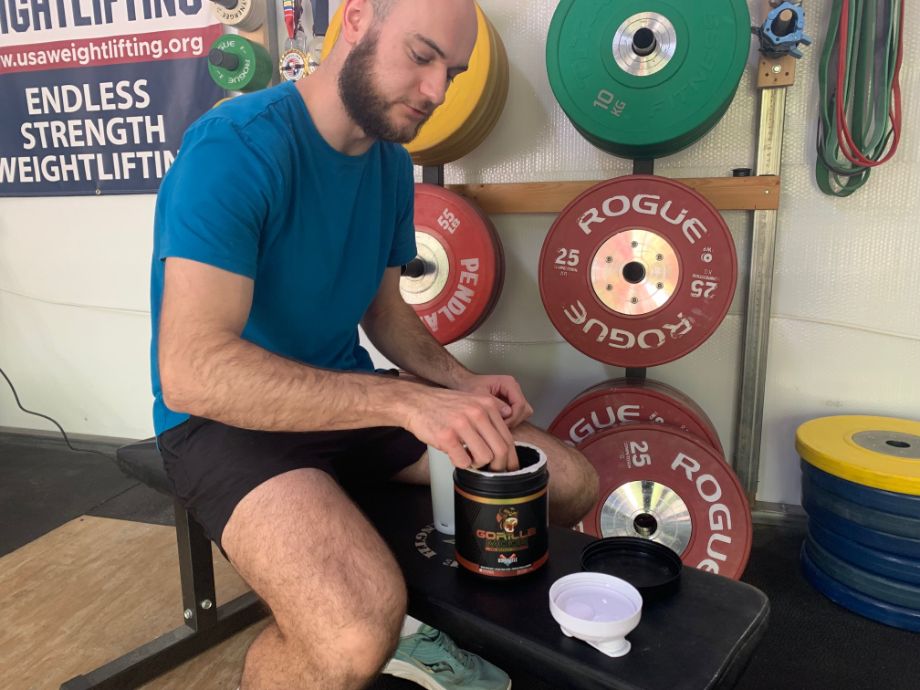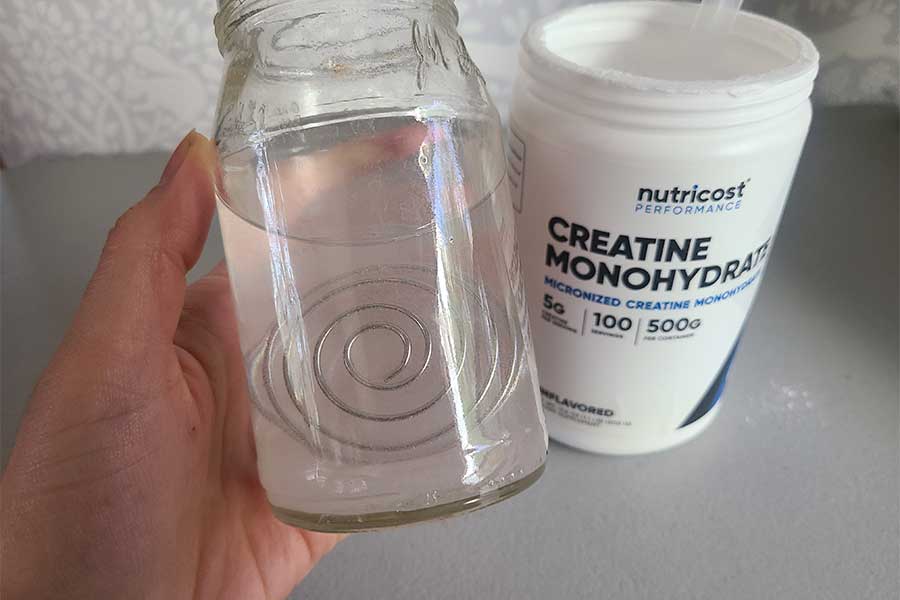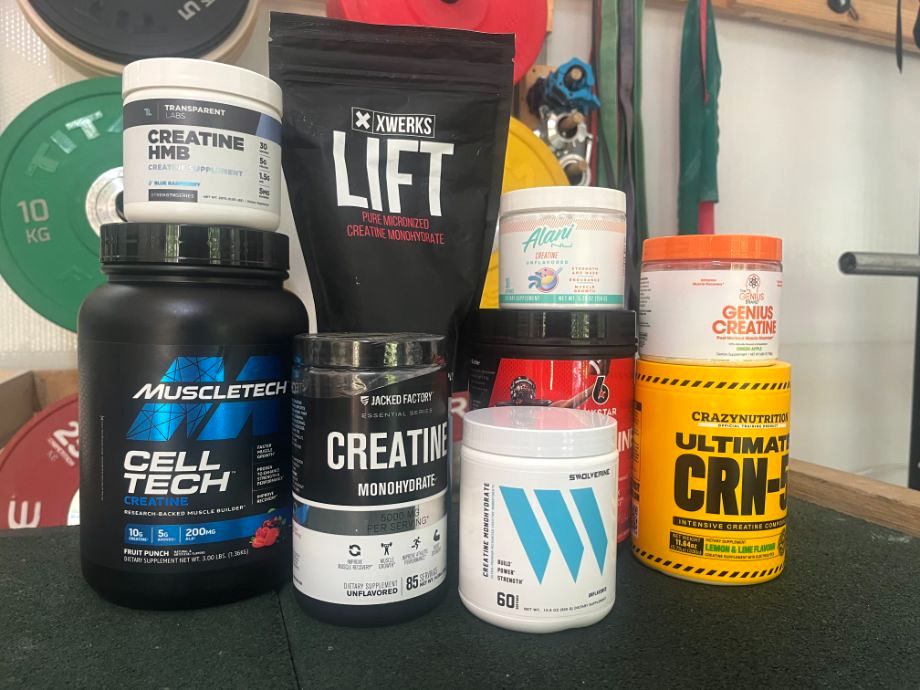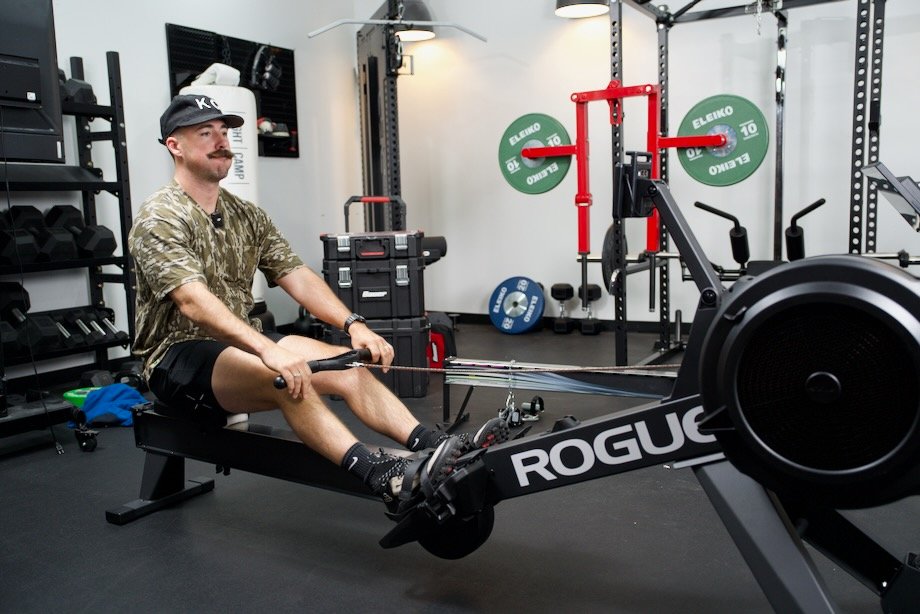At first glance, creatinine and creatine might look like the same word. Even on closer inspection, you might still think these words are identical.
The mix-up is understandable, as a few internet searches for either term yield results that treat them as synonymous. And believe me, it required meticulous attention to detail to ensure I typed and read the correct term for everything you’re about to learn.
However, despite their similarity in spelling, creatinine and creatine are quite different substances with unique purposes. Understanding this distinction is crucial, especially if you wonder how to use creatine effectively and worry about negative consequences like kidney damage.
Ready to delve deeper into creatinine vs creatine? First, make sure you have on your eyeglasses or contacts if needed. Now, join me—a dietitian—as we explore their unique characteristics.
Medical disclaimer: This article is intended for educational and informational purposes only. It is not intended as a substitute for medical advice. For health advice, contact a licensed healthcare provider.
What Is Creatinine?
Creatinine1 is the waste product of creatine in muscle. Don’t worry, the breakdown of creatine to creatinine results from normal muscle metabolism!

The creatine byproduct is produced at a fairly constant rate to maintain healthy blood (serum) levels of creatinine. After it’s produced, creatinine enters the bloodstream, gets filtered through the kidneys, and is excreted via urination.
Functions in the Body
Creatinine does not serve critical functions in the body. Instead, creatinine is a widely used marker2 for assessing kidney (renal) function.
A creatinine blood test is a standard procedure to assess how well the kidneys filter waste. Serum creatinine concentrations help estimate glomerular filtration rate3 (eGFR), a chief measure of kidney function. However, abnormal serum creatinine levels do not always indicate renal damage.
High creatinine levels may be due to:
- Chronic kidney disease or acute kidney injury
- Dehydration, leading to elevated serum creatinine concentrations
- A high protein diet, particularly heavy meat ingestion
- Strenuous and intense exercise
- Muscle disorders and injuries
- Certain medications, including cimetidine (an H2 blocker for heartburn and indigestion) and trimethoprim (an antibiotic for bladder infections)
Low creatinine levels may be caused by:
- Reduced muscle mass, whether due to aging, a sedentary lifestyle, diseases affecting muscle tissue, or malnutrition
- Excessive water intake, diluting blood creatinine levels
- Liver disease
- A low-protein diet
Due to differences in muscle mass and size, biological sex also influences creatinine levels. The reference range for adult men is 0.74 to 1.35 milligrams per deciliter (mg/dL) or 65.4 to 119.3 micromoles per liter (μmol/L). For adult women, the ranges are 0.59 to 1.04 mg/dL or 52.2 to 91.9 μmol/L.
These factors influencing creatinine levels make more sense after a better understanding of creatine.
What Is Creatine?
Creatine4 is a naturally occurring organic compound produced from amino acids—specifically arginine, glycine, and methionine—primarily in the kidneys, liver, and pancreas. Creatine synthesis accounts for about half the daily need for creatine, and the remaining must be obtained from high-protein foods—primarily red meat and seafood—or dietary supplements.

The enzyme creatine kinase converts and stores about 95 percent of creatine in skeletal muscle as phosphocreatine5, also known as creatine phosphate. The remaining portion is found in tissues like the heart, brain, and testes.
The body breaks down about 1 to 2 percent of creatine in muscle daily into creatinine. Therefore, creatine degradation to creatinine is greater in individuals with larger muscle mass and individuals with higher physical activity levels.
Functions in the Body
Creatine primarily supports energy production, especially in the muscles. During muscle contractions, the body breaks down phosphocreatine into adenosine triphosphate (ATP) for quick energy.
Bodybuilders and athletes highly value creatine supplements for boosting ATP production and energy during intense workouts, enhancing exercise performance in high-intensity exercises by up to 20 percent! Creatine also significantly increases muscle strength and size, especially in short exercises involving lower limbs6.
Beyond its muscular benefits, creatine exhibits neuroprotective properties, potentially mitigating the impacts of traumatic brain injuries (TBI) and spinal cord injuries (SCI). A 2021 review7 also suggests advantages for overall health, improving cardiovascular health, metabolic processes, bone density, and immune system functioning.
Key Similarities Between Creatinine and Creatine
Although creatinine and creatine are more different than alike, they share some similarities—beyond their (almost) identical spelling. Their likeness relates to metabolic processes and their direct relationship.
- Natural synthesis: Both creatine and creatinine are naturally produced by the body.
- Muscle metabolism: Creatine generates energy within muscles and is converted into creatinine during this metabolic process.
- Direct relationship: Changes in creatine levels, especially through supplementation, are directly reflected in creatinine levels.
While the list of similarities might be short, their key differences are more pronounced.
Key Differences Between Creatinine and Creatine
Although comparing creatinine and creatine may seem like comparing apples to oranges, grasping their key differences can enhance your understanding of each substance individually. Here’s a handy high-level overview for comparison.

Function
- Creatinine is a diagnostic tool for assessing kidney function. Elevated creatinine levels in the blood may indicate kidney damage or disease, as the kidneys filter out creatinine from the bloodstream.
- Creatine acts as an energy reservoir, particularly in the muscles, and generates energy for high-intensity activities such as sprinting or weightlifting.
Significance
- Creatinine levels in the blood and urine provide essential insights into kidney health. Monitoring these levels helps assess the organ’s filtering capacity and diagnose kidney disorders.
- Creatine enhances physical performance, strength, and muscle growth. Supplementing creatine is popular among athletes and bodybuilders who aim to increase exercise capacity and lean body mass. Research shows it supports metabolic, bone, and brain health across all ages.
Production
- Creatinine is produced through the metabolic breakdown of creatine, primarily within the muscles, when converted to energy.
- Creatine is synthesized by the liver, pancreas, and kidneys from the amino acids glycine, arginine, and methionine.
External Sources
- Creatinine is not obtained from external sources; its presence is solely a byproduct of the creatine metabolism in the muscles.
- Creatine comes from various dietary sources, including red meat, fish, and supplements.
Storage
- Creatinine is not stored in the body and is continuously filtered by the kidneys and excreted in urine.
- Creatine is primarily stored in skeletal muscle and smaller amounts in the brain, heart, and testes.
Is Creatine Safe?
Absolutely! Among the vast dietary supplements available, creatine—particularly in its monohydrate form—is esteemed as one of the safest and most effective supplements for enhancing athletic performance, aiding brain function, and more.
RELATED: Best Creatine

The International Society of Sports Nutrition (ISSN)4 finds no substantial scientific evidence to suggest that either short-term or long-term usage of creatine monohydrate (up to 30 grams per day for up to five years) poses adverse effects on healthy individuals or on clinical populations who might benefit from its supplementation.
Plus, creatine side effects are typically mild and temporary, including bloating, water retention, and weight gain. Some case studies report kidney dysfunction, so let’s examine this concern closely.
Creatine and Kidney Function
The primary worry about creatine intake centers on its potential impact on kidney function. This concern is valid, given creatine supplementation can increase creatinine levels and alter the estimated glomerular filtration rate (eGFR).
However, the concern about creatine causing kidney damage is a common misconception about creatine supplementation8 that’s been debunked over the past few decades.
It’s crucial to note that a rise in serum creatinine levels doesn’t inherently signify renal disease, just as a normal level doesn’t automatically exclude it. Relying solely on serum creatinine concentration to calculate the glomerular filtration rate is inadvisable and may be skewed by factors that don’t accurately reflect kidney health.

Further assessments, as highlighted in a case report2, should include comparing blood creatinine clearance to urine creatinine levels. Measuring the protein cystatin C is also proposed as a reliable marker of GFR since it’s less influenced by muscle mass and diet. Research published in the Journal of Hypertension10 encourages clinicians to consider an athlete’s muscle mass before evaluating renal function with cystatin C.
Creatinine vs Creatine: Final Thoughts
Creatinine and creatine may share some similarities beyond their similar spelling, but they are more different than alike. Let’s recap the final takeaways when comparing creatinine vs creatine:
- Creatine helps produce and store energy in muscle cells, while creatinine is the byproduct formed when the body breaks down creatine for energy.
- Both are produced in the body, but creatine can also be obtained from dietary sources such as red meat, fish, and supplements.
- Creatine is primarily used to enhance exercise performance, and creatinine levels measure kidney function.
- Creatinine levels can increase with creatine supplementation, although research supports such increases do not indicate kidney damage and disease.
- Creatine supplementation is highly regarded and considered safe. However, it’s always wise to consult healthcare professionals before starting any supplement, especially if you have a chronic condition like kidney disease.
Creatinine vs Creatine: FAQs
Are creatinine and creatine the same thing?
No, creatinine and creatine are not the same, though they are related. Creatine helps produce and store energy in muscle cells, while creatinine is the byproduct formed when the body breaks down creatine for energy.
Does taking creatine raise creatinine levels?
Taking creatine supplements can raise creatinine levels, though this increase is not necessarily an accurate indicator of kidney function. Moreover, abstaining from supplementation often returns creatinine levels to normal.
What happens if creatinine is high?
If your creatinine levels are high, it’s essential for your doctor to investigate the underlying cause. They will likely order follow-up tests, including an estimated GFR, to further assess kidney function.
Is creatine safe for kidneys?
Research consistently shows that taking creatine at recommended doses does not cause kidney disease or impair kidney function in healthy individuals. However, consulting your doctor before taking any supplements is advised, especially if you have a chronic condition such as kidney disease.
These statements have not been evaluated by the Food and Drug Administration. This product is not intended to diagnose, treat, cure, or prevent any diseases.
References
- ScienceDirect. (n.d.). Creatinine. Creatinine – an overview | ScienceDirect Topics. https://www.sciencedirect.com/topics/agricultural-and-biological-sciences/creatinine
- Williamson L, New D. How the use of creatine supplements can elevate serum creatinine in the absence of underlying kidney pathology. BMJ Case Rep. 2014 Sep 19;2014:bcr2014204754. doi: 10.1136/bcr-2014-204754. PMID: 25239988; PMCID: PMC4170516.
- Kaufman DP, Basit H, Knohl SJ. Physiology, Glomerular Filtration Rate. [Updated 2023 Jul 17]. In: StatPearls [Internet]. Treasure Island (FL): StatPearls Publishing; 2024 Jan-. Available from: https://www.ncbi.nlm.nih.gov/books/NBK500032/
- Kreider RB, Kalman DS, Antonio J, et al. International Society of Sports Nutrition position stand: safety and efficacy of creatine supplementation in exercise, sport, and medicine. J Int Soc Sports Nutr. 2017 Jun 13;14:18. doi: 10.1186/s12970-017-0173-z. PMID: 28615996; PMCID: PMC5469049.
- Guimarães-Ferreira L. Role of the phosphocreatine system on energetic homeostasis in skeletal and cardiac muscles. Einstein (Sao Paulo). 2014 Jan-Mar;12(1):126-31. doi: 10.1590/s1679-45082014rb2741. PMID: 24728259; PMCID: PMC4898252.
- Lanhers C, Pereira B, Naughton G, et al. Creatine Supplementation and Lower Limb Strength Performance: A Systematic Review and Meta-Analyses. Sports Med. 2015 Sep;45(9):1285-1294. doi: 10.1007/s40279-015-0337-4. PMID: 25946994.
- Kreider RB, Stout JR. Creatine in Health and Disease. Nutrients. 2021 Jan 29;13(2):447. doi: 10.3390/nu13020447. PMID: 33572884; PMCID: PMC7910963.
- Antonio J, Candow DG, Forbes SC, et al. Common Questions and Misconceptions about Creatine supplementation: What Does the Scientific Evidence Really show? JISSN. 2021;18(1). doi:https://doi.org/10.1186/s12970-021-00412-w
- Antonio J, Candow DG, Forbes SC, et al. Common questions and misconceptions about creatine supplementation: what does the scientific evidence really show? J Int Soc Sports Nutr. 2021 Feb 8;18(1):13. doi: 10.1186/s12970-021-00412-w. PMID: 33557850; PMCID: PMC7871530.
- Yasuda O, Yasuda H, Ohishi M. Muscle Mass and Estimated Renal Function in Athletes. J Hypertens. 2021;39(Supplement 1):e293-e294. doi:https://doi.org/10.1097/01.hjh.0000747832.74962.b1






